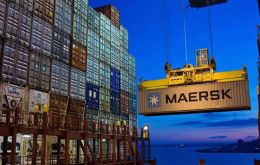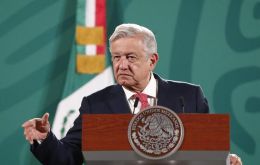MercoPress. South Atlantic News Agency
Economy
-
Saturday, June 12th 2021 - 08:00 UTC
Taxing corporate profits: Is change coming to the world’s economic weather?

By Gwynne Dyer – It’s not Bretton Woods, but it’s a start. The decision by finance ministers from G7 countries to create a global minimum tax rate on corporate profits, and reaffirmed by world leaders meeting in Cornwall, is a step in the right direction if only a baby step. The tide was due to turn about now, according to one theory, and maybe it’s finally happening.
-
Saturday, June 12th 2021 - 07:52 UTC
Queen Elizabeth and royal family host a reception for G7 leaders

Britain’s Queen Elizabeth hosted on Friday reception for leaders of the Group of Seven (G-7) richest nations, who are holding a three-day summit. The reception was held at Cornwall’s Eden Project, an attraction that features the world’s largest indoor rainforest within giant domes.
-
Thursday, June 10th 2021 - 21:15 UTC
Cruise industry interested in returning to Uruguay for the 2021/22 season

Uruguay has received over 200 requests for cruise vessels to call in Montevideo and Punta del Este for the coming 2021/22 season, (October/March), according to reports in the local media. Of the 200, 140 requests are for Montevideo and 60 for the international seaside resort of Punta del Este.
-
Thursday, June 10th 2021 - 17:02 UTC
Copa America loses leading sponsoring brewery

The Ambev brewery has announced Wednesday that they had decided to withdraw from the much controversial Copa America football tournament of South American national teams due to start in Brazil this coming weekend.
-
Thursday, June 10th 2021 - 09:30 UTC
Bitcoin legal tender in El Salvador, first country ever

The Parliament of El Salvador has passed with 62 out of 84 votes a bill submitted by President Nayib Bukele to classify Bitcoin as legal tender, thus becoming the first country in the world to adopt a cryptocurrency. Its use as legal tender will go into law in 90 days.
-
Thursday, June 10th 2021 - 09:05 UTC
Falklands Governor: a “superb season” for Fisheries based on catch volumes

On June first Falklands governor Nigel Phillips CBE, delivered the annual address to the Islands Legislative Assembly on the budget for the new financial year. The following is the chapter on Fisheries and the “superb season”, based on the catch numbers.
-
Wednesday, June 9th 2021 - 09:20 UTC
Maersk encouraged by the boom in global trade and container business

The growth of China’s exports to the United States is expected to boost global trade in 2021, according to Moller-Maersk. The logistics company predicts that global container trade is expected to increase between 5% and 7% in 2021 as consumers shift their demands, prioritizing the purchase of consumer goods over services.
-
Tuesday, June 8th 2021 - 09:00 UTC
Price of fuel goes up 12% in Uruguay

The Government of Uruguay Monday announced a 12% increase in the price of fuels due to the increase in the international value of oil, a product that Uruguay imports 100%.
-
Tuesday, June 8th 2021 - 07:43 UTC
China's international reserves in May reach US$ 3,22 trillion

Chinese gold and foreign currency reserves, the world’s largest, rose more than expected last month, according to official data published on Monday. The nation’s foreign exchange reserves increased by US$23.62 billion to US$3.22 trillion in May against US$ 3.198 trillion recorded in April.
-
Tuesday, June 8th 2021 - 07:15 UTC
AMLO loses legislative majority in Mexican Lower House

Mexican President Andrés Manuel López Obrador's (AMLO) centre-left ruling National Regeneration Movement (Morena) which lost the qualified majority in the Lower House after Sunday's elections.
